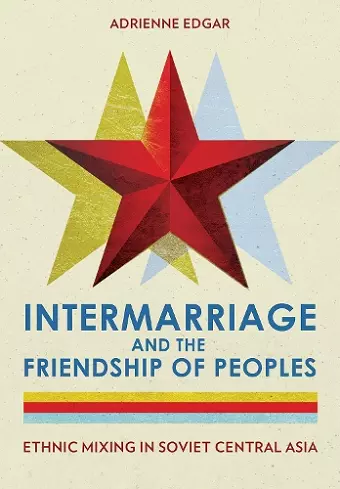Intermarriage and the Friendship of Peoples
Ethnic Mixing in Soviet Central Asia
Format:Hardback
Publisher:Cornell University Press
Published:15th May '22
Currently unavailable, and unfortunately no date known when it will be back

Co-winner of the Central Eurasian Studies Society's prize for best book in History and the Humanities in 2022 and 2023, and winner of the The Joseph Rothschild Prize in Nationalism and Ethnic Studies of the Association for the Study of Nationalities
Intermarriage and the Friendship of Peoples examines the racialization of identities and its impact on mixed couples and families in Soviet Central Asia. In marked contrast to its Cold War rivals, the Soviet Union celebrated mixed marriages among its diverse ethnic groups as a sign of the unbreakable friendship of peoples and the imminent emergence of a single "Soviet people." Yet the official Soviet view of ethnic nationality became increasingly primordial and even racialized in the USSR's final decades. In this context, Adrienne Edgar argues, mixed families and individuals found it impossible to transcend ethnicity, fully embrace their complex identities, and become simply "Soviet."
Looking back on their lives in the Soviet Union, ethnically mixed people often reported that the "official" nationality in their identity documents did not match their subjective feelings of identity, that they were unable to speak "their own" native language, and that their ambiguous physical appearance prevented them from claiming the nationality with which they most identified. In all these ways, mixed couples and families were acutely and painfully affected by the growth of ethnic primordialism and by the tensions between the national and supranational projects in the Soviet Union.
Intermarriage and the Friendship of Peoples is based on more than eighty in-depth oral history interviews with members of mixed families in Kazakhstan and Tajikistan, along with published and unpublished Soviet documents, scholarly and popular articles from the Soviet press, memoirs and films, and interviews with Soviet-era sociologists and ethnographers.
Adrienne Edgar's Intermarriage and the Friendship of Peoples is an outstanding study of the evolution of intermarriage practices in Kazakhstan and Tajikistan across the Soviet era and beyond.
(New Books Network)Edgar's research is in many ways original and innovative, and it thus opens a wide new field of research in Soviet studies that others might want to expand.It is rare to write this in a review, but I am thrilled by reading Adrienne Edgar's book on interethnic marriage.
(H/Soz/Kult)Adrienne Edgar's Intermarriage and the Friendship of Peoples explores an intriguing paradox: how and why did the Soviet multinational state espouse the concept of a singular, equal Soviet people, and yet simultaneously identify and promote ethnic and national identity categories?
(Asian Affairs Journal)Edgar convincingly reconstructs how intermarriage in the Soviet Union benefitted from its particularities
(Europe Asia Studies)It is rare to write this in a review, but I am thrilled by reading Adrienne Edgar's book on interethnic marriage
(Florin)One of the book's strengths is that Edgar takes a multigenerational view
(Asian Affairs)Edgar is more concerned with the messiness of lives lived than with theory, which is a great strength of the book
(Keller)Edgar's portrayal of the experiences of race, racism, and logics and practices of rationalization in the late- Soviet period makes several important contributions.
(Russian Rev- Winner of The Joseph Rothschild Prize in Nationalism and Ethnic Studies 2022 (United States)
- Winner of Best Book in History and the Humanities - Central Eurasian Studies Society (CESS) 2024 (United States)
ISBN: 9781501762949
Dimensions: 229mm x 152mm x 27mm
Weight: 907g
300 pages